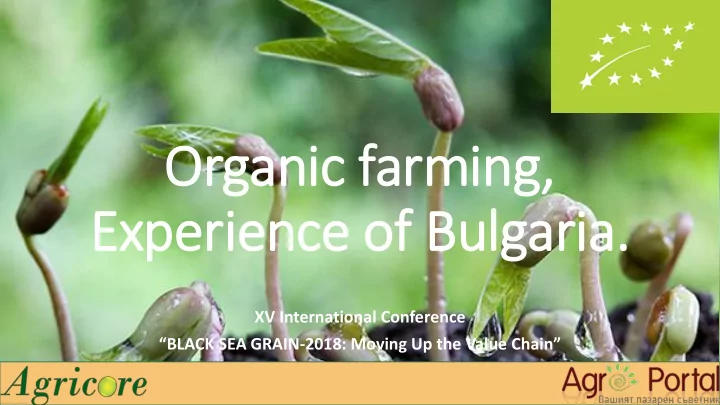

Organic farming, g, Experience of Bulgaria. XV International Conference “BLACK SEA GRAIN - 2018: Moving Up the Value Chain”
Organic production – the story of two apples or ….?
Mil ilestones of f EU organic farming/t /trade The concept • Crops are rotated so that on-site resources are used efficiently; • Chemical pesticides, synthetic fertilizers, antibiotics and other substances are severely restricted; • Genetically modified organisms (GMOs) are banned; • On-site resources are put to good use, such as manure for fertilizer or feed produced on the farm; • Disease-resistant plant and animal species adapted to the local environment are used; • Livestock are raised in a free-range, open-air environment and are fed on organic fodder • Animal husbandry practices are tailored to the various livestock species;
“ The Holy Bible” – EU directives № 834/2007 and № 889/2008 Multiple Annexes are attached to the Commission Regulation. Within these one can find the following: - Products permitted in organic farming, such as fertilizers, soil conditioners and pesticides - Minimum requirements on the size of housing and exercise areas for organic livestock. - Non-organic animal feed, feed additives and processing aids for the production of compound feed and premixtures permitted in organic farming. - Non-organic ingredients, additives and processing aids permitted in organic food production (including yeast production). - Products for cleaning and disinfection - Requirements on the Community logo.
Im Imports of f organic products to EU Commission Regulation (EC) No. 1235/2008 The EU regulates both organic food and drink produced and/or processed within the EU and organic goods from elsewhere (with detailed rules concerning import of organic products from third countries). These can readily be imported from non-EU countries whose rules on organic production and control are equivalent to the EU's - currently Argentina, Australia, Canada, Costa Rica, India, Israel, Japan, New Zealand, Tunisia, Republic of Korea, Switzerland and the United States of America. For all other non-EU countries, importers can have their organic products certified for import into the EU by independent private control bodies or control authorities approved by the European Commission.
Key facts of f EU organic production, th the big ig pic icture. • The sector adds appr. 400 kha each year; UK and Holand are down. • Close to 30 bln euros market cap; • Still below 10% of land converted into organic; • Employment engaged in organic farming is around 12%; • Support for organic farming is fading away, the fastest in France…; • “Trust” is the key word for developing of this sector; • Biggest consumers – Germany, Italy, Spain, France, Switzerland;
Share of f total organic area, , EU EU-28, , 2016
The market stats
Constraints. • Legislation is based on principles aging since last century; • Planting seeds are of a real problem; • Expensive food and inflated margins. • Sector is maturing; • Special handling is needed - “Bio Paradise” may easily become “the end of the story”; • Nutritional value, taste • Price behavior – usually follows the known concept of carry trade; • Irradation;
What about Bulgarian experience… • The fastest pace of growing land – up to 50% per year; • We are new but old enough to experience all the advantages and disappointments; • “Modern” crops – einkorn, spelt, lavender, alfa-alfa and etc … - real gold chicked egg or buble? • Subsidies; • Quality tests with durum wheat – average crude protein in organic durum 13,4 %, wet gluten – 27,2, against conventional 16.3 %, wet gluten – 32.1 %.
Watch carefu fully th this: Farmers choice - crop, exact variety, crop rotation; Do not become “night farmer” Crop preserving and storing; Costs for production; Markets price; Payment methods; Analyses;
Full coverage and guidance for EU organic legislation: https://ec.europa.eu/agriculture/organic/index_en
Thank you for your attention! Questions are welcome. • tel/fax. +359 52 511 237, cell.+359 889 383443 • office@agricore.eu www.agricore.eu
Recommend
More recommend